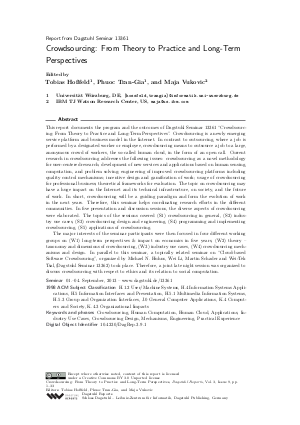Crowdsourcing: From Theory to Practice and Long-Term Perspectives (Dagstuhl Seminar 13361)
Authors Tobias Hoßfeld, Phuoc Tran-Gia, Maja Vucovic and all authors of the abstracts in this report
-
Part of:
Issue:
Dagstuhl Reports, Volume 3, Issue 9
Part of: Volume: Dagstuhl Reports, Volume 3
Part of: Journal: Dagstuhl Reports (DagRep) - License:
 Creative Commons Attribution 3.0 Unported license
Creative Commons Attribution 3.0 Unported license
- Publication Date: 2013-12-11
File

PDF
DagRep.3.9.1.pdf
- Filesize: 1.9 MB
- 33 pages
Document Identifiers
Subject Classification
Keywords
- Crowdsourcing
- Human Computation
- Human Cloud
- Applications
- Industry Use Cases
- Crowdsourcing Design
- Mechanisms
- Engineering
- Practical Experience
Metrics
- Access Statistics
-
Total Accesses (updated on a weekly basis)
0Document
0Metadata
Abstract
This report documents the program and the outcomes of Dagstuhl Seminar 13361 "Crowdsourcing: From Theory to Practice and Long-Term Perspectives". Crowdsourcing is a newly emerging service platform and business model in the Internet. In contrast to outsourcing, where a job is performed by a designated worker or employee, crowdsourcing means to outsource a job to a large, anonymous crowd of workers, the so-called human cloud, in the form of an open call. Current research in crowdsourcing addresses the following issues: crowdsourcing as a novel methodology for user-centered research; development of new services and applications based on human sensing, computation, and problem solving; engineering of improved crowdsourcing platforms including quality control mechanisms; incentive design and gamification of work; usage of crowdsourcing for professional business; theoretical frameworks for evaluation. The topic on crowdsourcing may have a huge impact on the Internet and its technical infrastructure, on society, and the future of work. In short, crowdsourcing will be a guiding paradigm and form the evolution of work in the next years. Therefore, this seminar helps coordinating research efforts in the different communities. In five presentation and discussion sessions, the diverse aspects of crowdsourcing were elaborated. The topics of the sessions covered (S1) crowdsourcing in general, (S2) industry use cases, (S3) crowdsourcing design and engineering, (S4) programming and implementing crowdsourcing, (S5) applications of crowdsourcing. The major interests of the seminar participants were then focused in four different working groups on (W1) long-term perspectives & impact on economics in five years, (W2) theory -- taxonomy and dimensions of crowdsourcing, (W3) industry use cases, (W4) crowdsourcing mechanisms and design. In parallel to this seminar, a topically related seminar on "Cloud-based Software Crowdsouring", organized by Michael N. Huhns, Wei Li, Martin Schader and Wei-Tek Tsal,(Dagstuhl Seminar 13362) took place. Therefore, a joint late night session was organized to discuss crowdsourcing with respect to ethics and its relation to social computation.
Cite As Get BibTex
Tobias Hoßfeld, Phuoc Tran-Gia, and Maja Vucovic. Crowdsourcing: From Theory to Practice and Long-Term Perspectives (Dagstuhl Seminar 13361). In Dagstuhl Reports, Volume 3, Issue 9, pp. 1-33, Schloss Dagstuhl – Leibniz-Zentrum für Informatik (2013)
https://doi.org/10.4230/DagRep.3.9.1
BibTex
@Article{hofeld_et_al:DagRep.3.9.1,
author = {Ho{\ss}feld, Tobias and Tran-Gia, Phuoc and Vucovic, Maja},
title = {{Crowdsourcing: From Theory to Practice and Long-Term Perspectives (Dagstuhl Seminar 13361)}},
pages = {1--33},
journal = {Dagstuhl Reports},
ISSN = {2192-5283},
year = {2013},
volume = {3},
number = {9},
editor = {Ho{\ss}feld, Tobias and Tran-Gia, Phuoc and Vucovic, Maja},
publisher = {Schloss Dagstuhl -- Leibniz-Zentrum f{\"u}r Informatik},
address = {Dagstuhl, Germany},
URL = {https://drops.dagstuhl.de/entities/document/10.4230/DagRep.3.9.1},
URN = {urn:nbn:de:0030-drops-43545},
doi = {10.4230/DagRep.3.9.1},
annote = {Keywords: Crowdsourcing, Human Computation, Human Cloud, Applications, Industry Use Cases, Crowdsourcing Design, Mechanisms, Engineering, Practical Experience}
}
